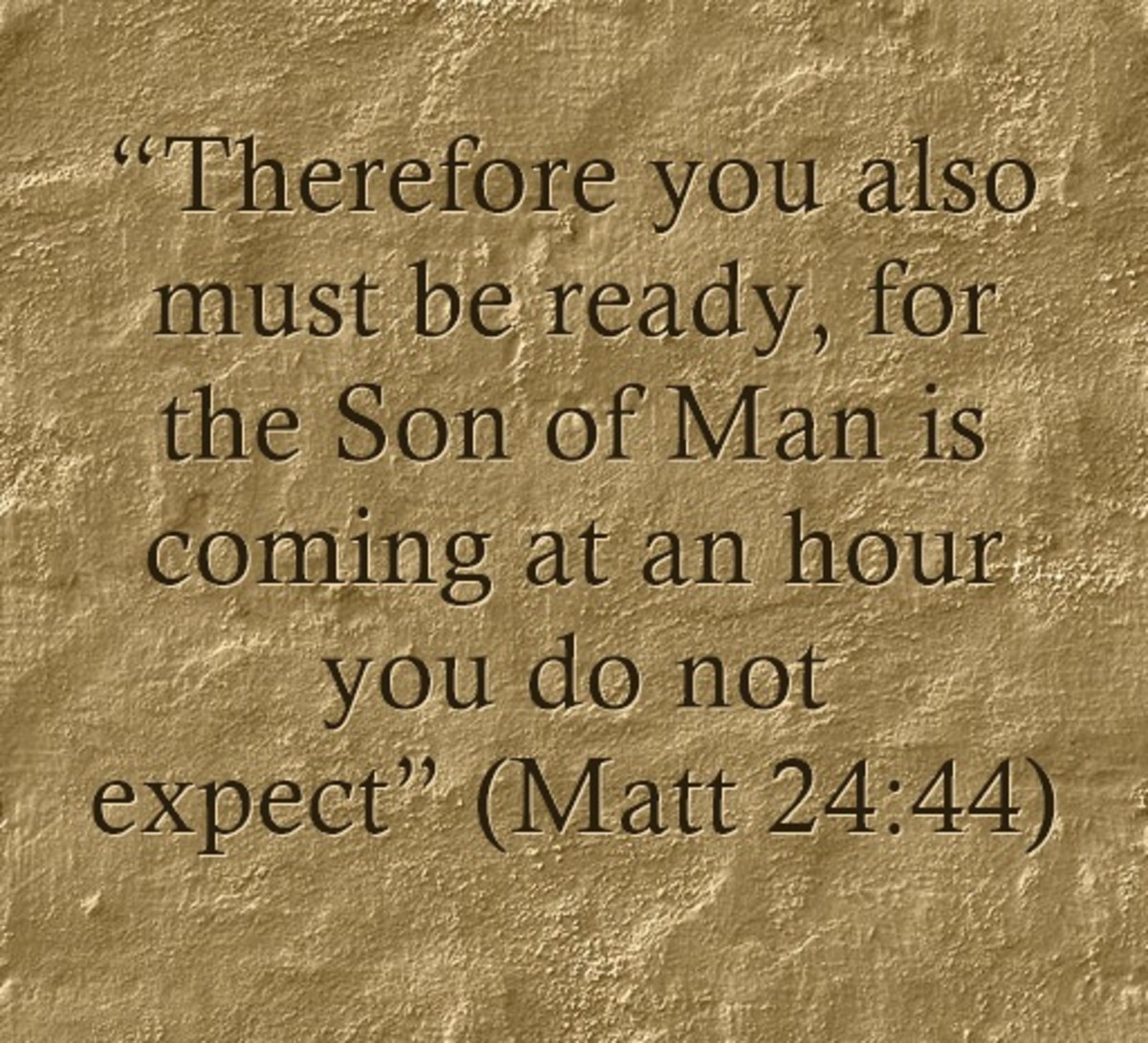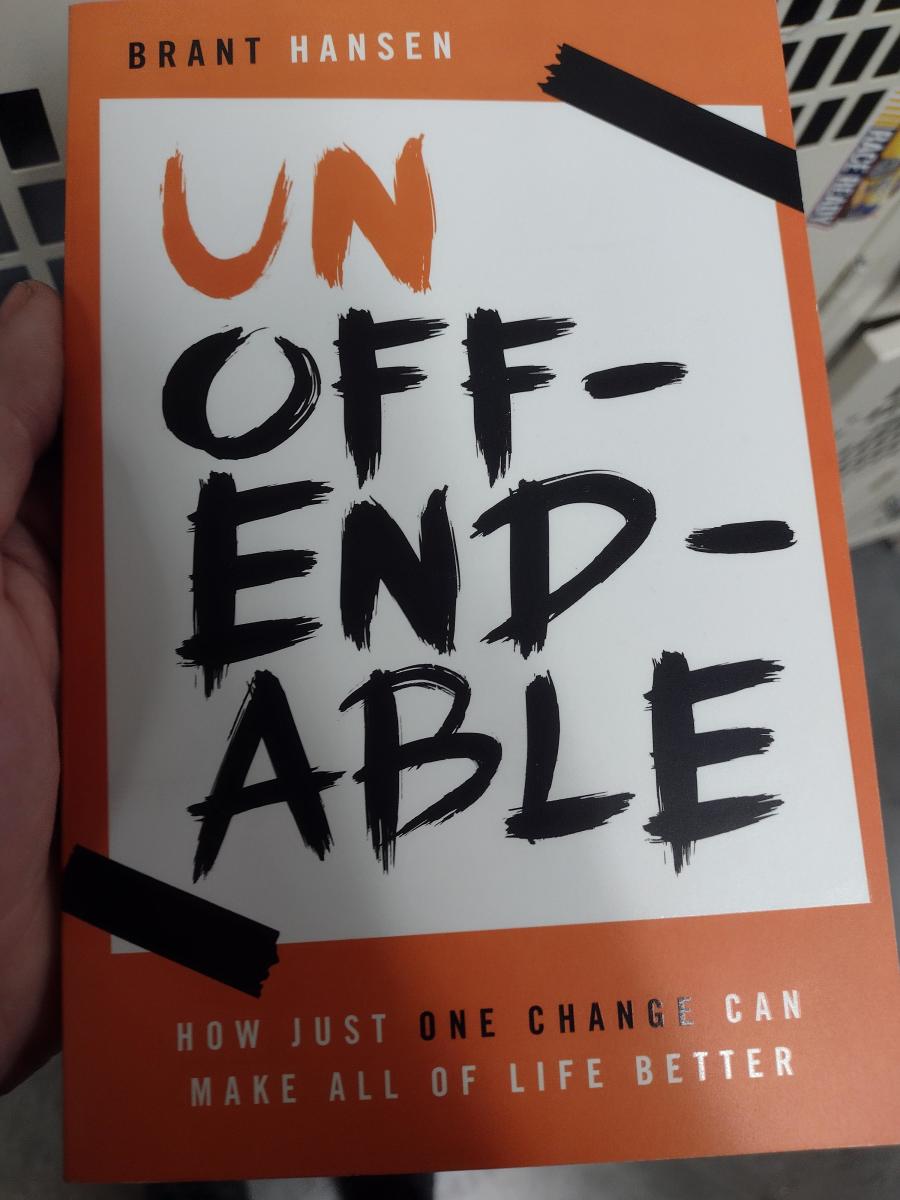Elementary Doctrines - Eternal Judgment
God is in Control

Eternal Judgement
We are at the last of the series entitled “The Elementary Doctrines” and, to review just briefly, from the 6th chapter of the book of Hebrews we are told what the elementary doctrines are and they are: repentance from acts that lead to death, faith toward God, baptisms, the laying on of hands, the resurrection of the dead and eternal judgment. (Inserted – actual verse—“Therefore let us leave the elementary teachings about Christ and go on to maturity, not laying again the foundation of repentance from acts that lead to death, and of faith in God, instruction about baptisms, the laying on of hands, the resurrection of the dead, and eternal judgment.” – Hebrews 6:1,2)
We’ve gone through all of the other five and now we’ll consider, in this program, eternal judgment. To introduce this concept I want to tell you of a story that took place some 20 or more years ago. I was in law school, in my first year of law school and it was a time when there was a civil war going on in Nicaragua and I believe it was an ABC news reporter—his last name was Stewart—and he was covering the war in Nicaragua. The cameraman was behind him and so the whole matter was filmed. He and his party was stopped in what looked like a remote area at an army checkpoint; he was made to lie down on the ground and in a little while one of the soldiers pointed an M-16 rifle at the back of his head, took a few steps back and shot him point bland and it was captured on tape.
That news clip was later shown all over the world on various networks and it brought down the government of Anastasio Samosa and paved the way for the revolution that occurred in that country subsequently—in the country of Nicaragua. I remember, as a young law student, how this action outraged me, inflamed me; I was so angry that I couldn’t rest for days. I was now in the profession of pursuing justice and, in my mind, there was not going to be any justice here. It was a murder that was caught on TV and shown all over the world and it occurred to me that there would be no justice—that the killer would not be brought to justice. And I’m not sure that he ever was; I don’t know that I’ve heard any stories that say that who he was, was discovered and so on.
So I got to thinking and I talked to the Lord quite a bit about it and my concern, expressed to the Lord, was, “How could this be? Where is justice? How could somebody so callously murder another human being? Admittedly it goes on all the time all over the world and not filmed. And the Lord said to me at that time, “He may escape human judgment for the entirety of his days but he will not escape my judgment.” And that was my first confrontation with the reality of eternal judgment and I’ll tell you, there was nothing else that had the capacity to slow me down or to quench the passion for justice that I had, thatthat particular story, that particular episode inflamed in me. I sensed that every person, who is a believer in Jesus Christ (and even if you are not), many people have this passion for justice—to see that things be done properly and to see that crimes be punished, to see that heinous crimes not go unpunished.
Well I have observed Christian activism and in Christian activism there are the roots of the very same thing. Now the notable Christian, Dietrich Bonhoeffer, was hanged by the Nazis. He was a man of great passion and he saw how wrong the incarceration of—and the subsequent genocidal process that murdered 6,000,000 Jews—he saw it as it unfolded. And he saw that the entire German population was swept up in the war and no one was raising an outcry against this fiendish evil that had crawled across Europe into North Africa, had aligned itself with the Japanese and was moving across the earth. And, in his passion for justice, he was moved to join a plot to murder Hitler.
Now here is the question: was it right for Bonhoeffer—assuming he had succeeded I mean, once the plot was formed and actions were begun that would lead to the murder of Hitler, one may properly assume that all of the co-conspirators agreed to the eventual outcome. The fact that it did not happen is purely beside the point. If it had happened it would have been the fulfillment of their intention so we know what was in the heart. Here is the dilemma that Christians often find themselves in, and it flairs up in a variety of contexts—and we’ll speak about one or two of these contexts in just a moment—and that is to engage in murder to prevent more murders.
It is very clear that Hitler was engaged in the systematic extermination of 6,000,000 Jews and another 10,000,000 or so of other kinds of people—gypsies and other people—an unspeakable atrocity. The question is: would it have been right, and was Bonhoeffer right, to engage in a plot to murder Hitler when the Scriptures make it abundantly clear that murder is not what God wants. “Thou shalt not murder.” (Inserted – actual verse—“You shall not murder.” – Exodus 20:13) We’ve—in more recent times—we have been confronted with a less spectacular example of that but it’s the same question: is it right to murder abortion doctors who perform abortions that murder children?
There is a case that was decided in Florida recently, and I believe the defendant is now on death row for murdering an abortion doctor. Now if you find yourself in the position of waving aside the Scriptures in order to fulfill—supposedly—the Scriptures, then you’ve placed the Scriptures in contradiction with itself. The evangelical church has not articulated a coherent position with respect to this very difficult question but indeed it isn’t that difficult. It’s a matter of faith and it’s actually a question of whether or not there is such a thing as “eternal judgment”.
Is God, in fact, in charge and does he, in fact, call all things into judgment and are we to rely on that judgment as opposed to taking matters into our own hands and killing people in order to prevent others from being killed? Let me make a clear exception here because I believe the Scriptures do make a clear exception and it is the exception that relates to the execution of people convicted of the crime of murder through the due process of law. Now it is clear from Romans that God has established a process of order and law and when order and law go forward one of the consequences may be that, for wrongdoers, God has authorized that they be put to death.
This is vastly different from a situation in which an individual or a group of individuals inveigh, in some fashion, against the existing governmental regulations and rules and take the matter privately into their own hands. It is hardly a stretch of the imagination to see that if every group who feels “entitled” to some form of redress that has been denied them through the legal process, decides that the appropriate answer would be to engage in the killing of others. It requires no stretch of the imagination to see how quickly any society would descend into anarchy.
In the case of Adolph Hitler it may also be argued that here you were having “state-sponsored” murder and in the case of abortion you may also argue that you have “state-sponsored” murder. This is the point at which we must bring forward this question of eternal judgment… of eternal judgment. First the two words: eternal and judgment. Eternal is the word “eon” in the Greek and it has a multiple of meanings. One of the meanings is “for an age”. Another is “from one age to another”… so from age to age. And yet a third meaning is “age upon age” or endless ages. This recognizes that outside of human time—which is linear—there is an eternal perspective and in this eternal perspective there is a radical difference from irrational or temporal or logical progressionthat forms the basis of that perspective.
In a rational perspective we know only yesterday and today and we extrapolate to tomorrow so we make rules based upon yesterday’s problems and today’s potential problems and we put those rules together in such a way as to bring government and order to the future. And in that process there is an urgency to arrest conduct and to punish conduct—to deter future conduct so that we might guarantee some sense of the future—of order and of peace and of well being. But from an eternal perspective, there is no concept of past or present or even future because all of the matter is known—the end is known from the beginning.
It is somewhat like: if you are the director of a movie and you have done the final cut, you’ve rolled the movie up onto one of these rolls, and it’s going to be shown at the premiere. If you are the director at the premiere, you know the end of the story from the beginning. The audience, however, is not so privileged so the audience has to wait for the film to unfold in order to know what the end will be. So if you are the audience you have one goal and if you are the director you have another goal. If you are the audience, your goal is to get to the end of the story. If you are the director you begin knowing the end of the story before you begin so your goal is not to get to the end of the story. Your goal is to see how the audience responds.
God is the director and we are the audience. If we take on the role of God and extend the boundaries of our sense of judgment before or beyond what God has told us to do then we are entitled to the frustration of not knowing the end from the beginning. Now this problem is what moves people to activism, to Christian activism even, which, if followed out properly may well—as in the case of Bonhoeffer and recent murderers associated with the abortion question—they may be moved by the urgency of changing present policy so that the future ensures a form of order consistent with their belief structure. This displays a singular failure to understand that God is sovereign and that God knows the end of a matter from the beginning and when He lets a thing go it is not because He likes the matter, or He doesn’t like it; it is that He has a point of view that is different from the linear point of view that commonly characterizes the human point of view, or the rational point of view.
So for example you take Jesus and the story of Jesus who comes to earth and dies. If you were to view the story of Jesus from a rational point of view—from a humanistic point of view—then here would be the result: a man is unfairly accused, judged, condemned and executed. Now Peter would be in the right—anticipating that event unfolding as it in fact, did—Peter would be in the right for whipping out his sword and trying to defend Jesus because at least it could be said that Peter was impressed with the innocence of Jesus with respect to the things with which He would be charged. And rather than being rebuked by Jesus, he ought to have been commended by Jesus for stopping the potential execution of the Lord. (Inserted – actual verse—“Then Simon Peter, who had a sword, drew it and struck the high priest’s servant, cutting off his right ear. (The servant’s name was Malchus.) Jesus commanded Peter, ‘Put your sword away! Shall I not drink the cup the Father has given me?’” – John 18:10,11)
But—and it brings forward this question: why did not the Almighty God, All Powerful, stop such an atrocious execution of a genuinely innocent man? More than that: why did Jesus—who claimed that He could call down “legions of angels” in His own defense—elected not to do so and therefore allowed a murder to continue, to go forward, that would then create enormous guilt and equally enormous eternal consequences to His murderers? (Inserted – actual verse—“Do you think I cannot call on my Father, and he will at once put at my disposal more than twelve legions of angels?” – Matthew 26:53) If He had come to save the world why did He not save himself and thereby save the ones who were associated with His murder and His trial and His murder?
You see, in a linear way it doesn’t make sense but from an eternal point of view why was it that Jesus would not defend himself, why was it that the Father would not save Him from execution and why was it that Jesus would turn around and rebuke Peter for trying to save Him? The answer is simple: from an eternal point of view the murder of Jesus had an importance that went well beyond the span of time and the ability of humans within time to understand. What was the purpose of the murder of Jesus—and make no mistake, it was His murder from the standpoint of those who executed Him—what was the point of it?
The point was that from an eternal point of view there would be two things: number one, that His death would be substitutionary and would, by it, free all humans. And secondly, God knew that God would raise Him from the dead and His murder would be cured by the resurrection from the dead and even in the fact that He died, He would be able to save all those who murdered Him. So, this is the point: that if you understand an eternal point of view, then you will know that every act is brought into judgment, for so indeed say the Scriptures. (Inserted – actual verse—“You, then, why do you judge your brother? Or why do you look down on your brother? For we will all stand before God’s judgment seat. It is written: ‘As surely as I live,’ says the Lord, ‘every knee will bow before me; every tongue will confess to God.’ So then, each of us will give an account of himself to God.” – Romans 14:10-12)
For every thought will be brought to judgment and every action will be brought to judgment. With that being said, the believer has the privilege of recognizing that he has not been committed to the role of “judge” but it is not the same as saying that there will be no judgment. Listen to Jesus from the 17thchapter of John, “Father, the time has come. Glorify your Son, that your Son may glorify you. For you granted him authority over all people that he might give eternal life to all those you have given him. Now this is eternal life: that they may know you, the only true God, and Jesus Christ, whom you have sent. I have brought you glory on earth by completing the work you gave me to do. And now, Father, glorify me in your presence with the glory I had with you before the world began.” – John 17:1b-5)
So there is a purpose to all of our lives and there is a purpose even to the things that are being done. One may ask the question: was there an eternal purpose that was accomplished through Hitler’s atrocities? And the answer is: clearly there was. How great is the eternal purpose for the return of the Jews to the land of Israel? Probably greater than we understand today. Did it justify their murder? No, the murderers will be brought into judgment. But the actions had an eternal purpose to them just as the action of the murder of Jesus—though horribly wrong, a great miscarriage of justice, an unspeakable crime—had an eternal purpose.
If you do not see that there is a great eternal purpose being worked out here below in the earth then you will have the unrequited hatred, hubris, passion that may even justify—in your own mind—the commission of murder. The very thing you despise, you may be reduced to doing it simply because you have no other alternative. I watch Christians today being caught up in the moment trying to bring about justice, trying to bring about righteousness through legal process and trying to bring about right conduct through social action because—and their answers routinely would be, “If we didn’t do it think about all of the harm that would result.” That’s true, but there will be great harm that will result.
But the end of the matter is not what we can do to redress it. The end of the matter is that nothing escapes the scrutiny of the Most High and we are only authorized to do such things as the Living God himself authorizes us to do. God has given a delegation to governments to act, even to the point of taking life. If governments falsely take life then the ones responsible will also be brought into judgment and an entire nation might be brought into judgment. For example, the American nation is highly likely to be brought into judgment for its systematic legal murders of uncounted millions of unborn children. It will be brought into judgment for that, but for an individual or a group of individuals to take up the arms to kill those who are practicing abortion doesn’t solve the problem. You’d have to kill all of the people connected with this and you’d have to kill everyone who has the desire to see it happen or the thoughts about it. There would be no end to the river of blood and at some point you could not distinguish the “good people” from the “bad people”. Eternal judgment keeps us out of this quagmire. Rest assured that God is in control.
Scripture References:
Hebrews 6:1,2
Exodus 20:13
John 18:10,11
Matthew 26:53
Romans 14:10-12
John 17:1b-5








